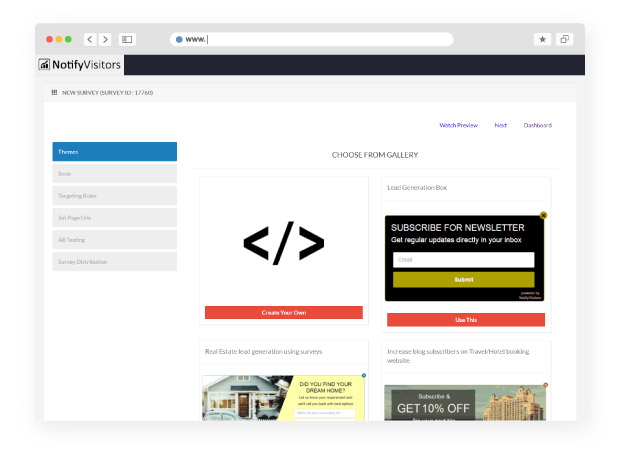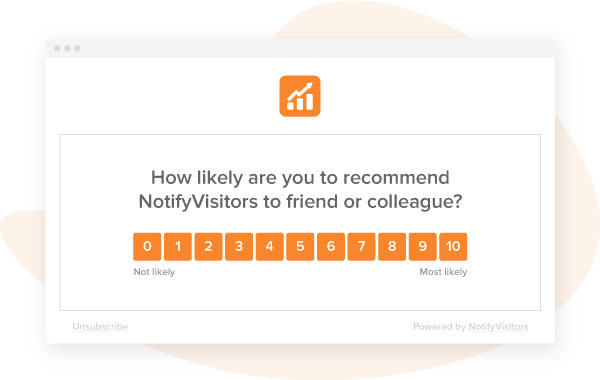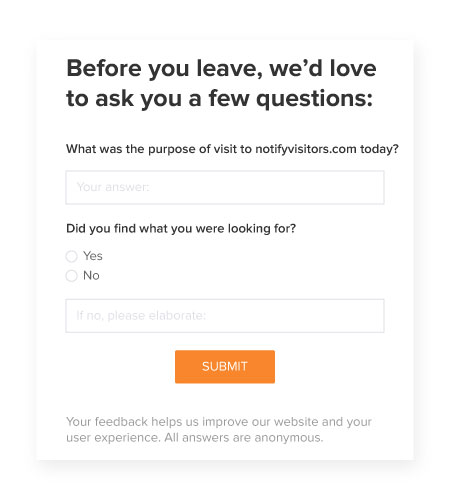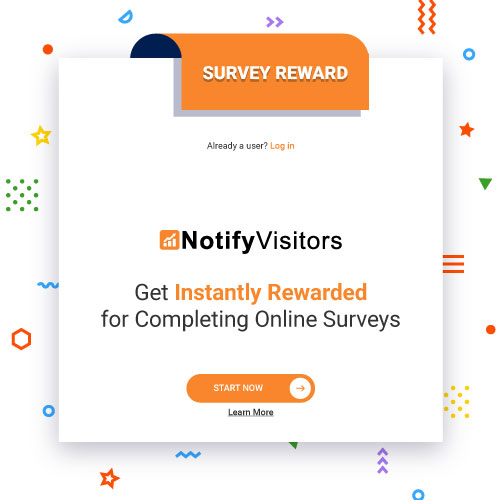Web Survey is a proficient tool to gather relevant data and information from the targeted audience but this is just one side of the coin. Want to know what makes it more effective, the internal aspects of these surveys which many marketers fail to recognize.

Many marketers fail to use this online survey tool to the best of their use because they are not aware of the web survey guidelines for designing web surveys. If you are facing the same issues, this is a wake-up call to get aware of how to set a survey and collect qualitative as well as quantitative data.
Read this blog to know how to design an effective web survey.
Contents
What Leads to The Success of The Web Survey?
You might be using a web survey as a tool to collect customer data from the audience but might not be getting the results as per your expectations. For your information, the success of the survey depends upon how you have created them and what techniques you have been using to deploy them.
Below are the factors that can make your surveys more successful & effective :
- Be clear and concise in your objectives about what type of data you want to collect.
- Make sure you have all the statistics of the users whom you are surveying. Know the topic of the survey and how you will be creating it.
If your requirements are not defined and too complex to understand and you have laid down objectives without any specific approach, then it would be harder for you to make good use of surveys. Also, insufficient data while creating online surveys could lead to the failure of getting successful results.
What are The Pros and Cons of a Web Survey?
Web Surveys are one of the traditional tools that a marketer picks up to gather information. They still have not lost their charms as you can connect with the audience and know what they want and what they think about your products and services. Let us count some of the advantages of the surveys :
1. Reasonable and Time-Saver
You can conduct web surveys with a minimum amount of resources and information. The respondents have to fill in the information asked by the surveyor. Due to the online extraction of information, it becomes more reasonable and time-saving for both parties.
2. No Specific Limit
You can gather data or information within minutes through surveys. Of course, there is no specific time limit for filling the survey. But you still get the responses within the margin of a few days.
3. Easy to Implement
You need not have a large investment in collecting information via surveys as you just have to send them online through a link on the email or just embed them on your website. You need not worry about the printing part.
4. Incorporate Different Elements
You can create changes in the surveys for your target audience by incorporating different elements like text fields, button clicks, and radio boxes.
What are The Disadvantages of The Web Survey?
There are two sides of a coin, if you are attaining positive sides from a survey there could be chances that you might be facing some constraints too. You must be aware of the other side too :
1. Connectivity Issues
You need to have a good internet connection which allows you to send surveys to different people in any part of the world.
2. Complications
There could be possibilities of having unreliable data as there is no interviewer available to ease out the data entered into the web survey.
3. Online notifications
There could be chances of your targeted audience of not replying to the surveys as they might be getting notifications for the survey in advance.
In order to avoid the complications and carry on with the process of using surveys to your best potential. See the below web survey guidelines for designing effective web surveys.
You can get useful insights about your users’ experience as to what they want, what you need to improve, and what is not working at all. Also, it depends on your business type.
What are The Guidelines to Design an Effective Web Survey?
1. Obtain Important Insights

See and evaluate the questions you are asking your respondents is driving instant responses and adding value. Also, they are helping you to achieve the research goals. Don’t ask unnecessary questions. If you think the information is irrelevant to gather then don’t ask so as to save your time. First of all, identify the data you want to collect and then ask further questions.
2. What Matters is The Introduction

The first impression is certainly the last impression. The very first thing users get to see on the opening screen of the survey matters a lot. Users could understand the main motive and objective of your survey. Remember to keep the survey short and brief so that not much time is wasted in gathering relevant information.
3. Ask One Question At a Time
Do not try to put everything into a single question as it will create confusion in the minds of the users and lead to inaccuracy in responses. Don’t put the word “and” in your questions, it could symbolize that your question might have two parts. The customer would not be able to figure out how and what to answer.
For example – You asked them a question as to “ which brand of cosmetics is reasonable and better customer g. This “and” can create confusion in the minds of the users as to what they have to exactly answer.
4. Avoid Asking Biased Questions
Refrain from the words you use in your questions which can create “biases” into the questions. Don’t try to put words into the mouth of the customers as it will create a sort of bias. Make sure you ask “to the point” questions that allow users to answer in simple terms. Therefore be aware of the adjectives and the words you use.
5. Use Simple Language or Words

Make use of simple and detailed terms & sentences while conducting the survey. Use the language which your respondents can make sense of, if you will be using any technical slang, it will create hassles in the respondents’ responses.
6. Usage of Images in Web survey

You can use images in different sections of your web survey, it can not only influence the conversion rates but it is very much important in analyzing the survey behaviors. You can create two or three variations of the survey with different designs and send them to different audiences. See which design is getting more responses.
7. Understand Mobile Limitations
Keep in mind that many of the users are nowadays using mobile phones rather than computers. Therefore create a survey considering the mobile users. There are of course certain limitations for the mobile users. The issues could be the slow down of mobile servers, users could find it hard to read the surveys and could find it more distracting in using phones to fill surveys.
Note: Do not use multiple-choice questions which could disturb the UI of the surveys.
8. Rephrase Yes or No Questions

Avoid asking yes or no questions which do not provide accurate information. You can include phrases such as “How much”, “How often” or other phrases. To get an accurate and rich data, better include a response scale.
9. Research Your Target Audience

Creating questions and other stuff is important for getting sustainable data. But another important web survey guidelines while creating surveys is you need to research your target audience in the context of when can you receive quick responses from them. For example – Office workers will only respond during the off-hours or on weekends, therefore it would be better if you approach them during the work hours or you can request them to take some of their time to complete the surveys.
10. Reward for Survey Completion

Offer them rewards and incentives for completing the survey. You can definitely increase the number of responses to the survey through this approach. You can offer some discount codes or coupons for completing the survey. That is how the audience will feel more interested in filling up the surveys.
11. Test Your Survey

Once you create the survey sample, it would be good that you test your survey to look into what possible errors your survey has. Ask at least five or six people to correct the problems you have in them before you finally send it to the target audience.
Conclusion:
Therefore the results of surveys directly depend upon how you have created them. Try to invest as much as you can in developing and creating a survey so that you can achieve the objectives. Follow the above web survey guidelines to design web surveys and achieve unlimited benefits in order to gather accurate data and information.
Read Also:

























 Email
Email SMS
SMS Whatsapp
Whatsapp Web Push
Web Push App Push
App Push Popups
Popups Channel A/B Testing
Channel A/B Testing  Control groups Analysis
Control groups Analysis Frequency Capping
Frequency Capping Funnel Analysis
Funnel Analysis Cohort Analysis
Cohort Analysis RFM Analysis
RFM Analysis Signup Forms
Signup Forms Surveys
Surveys NPS
NPS Landing pages personalization
Landing pages personalization  Website A/B Testing
Website A/B Testing  PWA/TWA
PWA/TWA Heatmaps
Heatmaps Session Recording
Session Recording Wix
Wix Shopify
Shopify Magento
Magento Woocommerce
Woocommerce eCommerce D2C
eCommerce D2C  Mutual Funds
Mutual Funds Insurance
Insurance Lending
Lending  Recipes
Recipes  Product Updates
Product Updates App Marketplace
App Marketplace Academy
Academy

